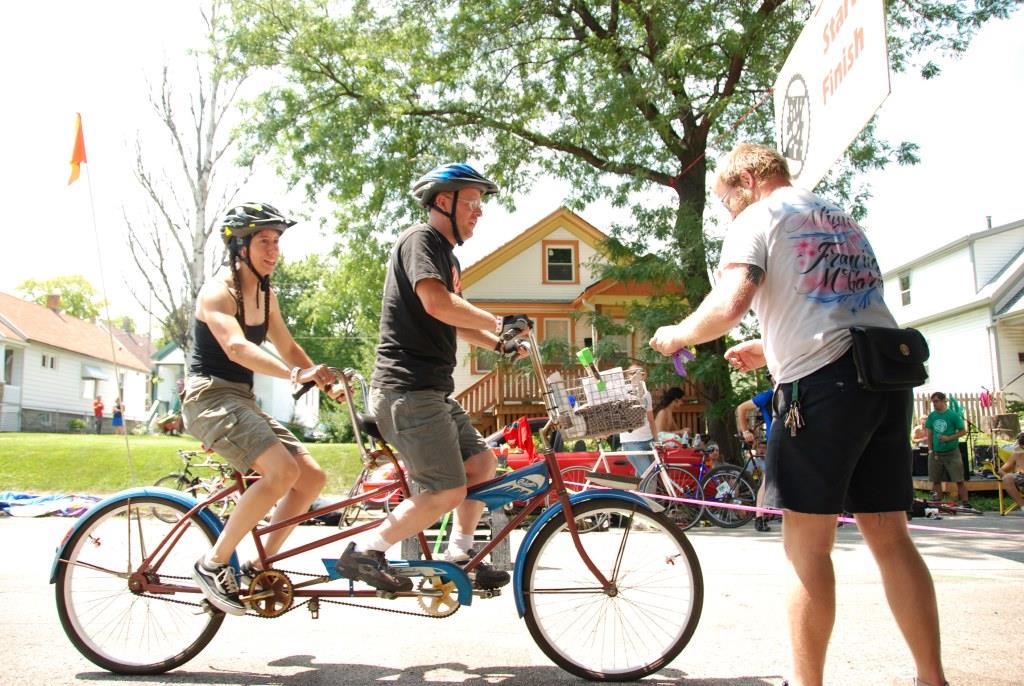Lessons From the Back Seat
Laney Keeshin explains how being a first-year teacher is like riding a tandem — on the back seat.
When was the last time you rode on the back of a tandem bike? For me, it was 1997, until a few months ago when a friend asked me to go bike riding after school on a sunny Monday afternoon.
We planned to rent bikes and ride around town, but a 5 p.m. arrival at the Urban Ecology Center left us with the only bike still available: a tandem.
We lugged the bike to the street, and I hopped on the back seat, which was much too small for my legs and height.
When I explained to my friend that it had been a very, very long time since I’d been on one of these, he chuckled at my increasing anxiety, and replied, “Ah, you’ll be fine! Just have fun!” and he moved our bike into motion.
We inched forward and wobbled to a quicker speed. I realized that I really didn’t know what to do first, and I didn’t have a helmet on. I might fall any minute.
My body suddenly froze. “Wait! Stop! Let’s practice first? We don’t even have helmets on! We should, like, learn how to do this first.” My friend was clearly eager to get on the trail, but he heard my cries for help and we did two short practice loops.
On a tandem bike, the person in back can’t see what’s ahead. She also can’t tell what the driver is going to do next.
My friend didn’t intend to scare me, but he didn’t let me know when we were making a turn, or when he wanted to speed up or slow down. After two practice loops, I felt my heart pounding in my chest. I still feared we might fall off, and this would be a big disaster.
We finally got into a groove on the trail, but all I could see in front of me was a sea of orange (my friend’s windbreaker). I did not feel comfortable… and it was making me crazy.
I am not type-A, so something else was going on in those first moments of riding on the back of a tandem. I think it was that I tried something that I had little experience with, and it was scary. Hey, it’s kind of like teaching…
For many reasons, teaching in urban schools is like riding on the back seat of a tandem.
All teachers, especially those in their first year, need some control and order to be successful in the classroom. You want to know what direction you are heading.
Without control we might feel very uncomfortable. What if you could not see what was ahead of you, but you had to keep going anyway?
As I begin my second year in the classroom, I’ve been reflecting on the challenges new teachers in urban schools face. Here are the top five:
1. You are uncomfortable with the lack of control
In my first year of teaching, I did not have the luxury of having control over many things in my work environment.
There is a lack of order, control or organization in many of our public schools. We cannot point a finger because it’s a complex, deep-rooted issue.
Some of the sources of our unstable work environment are: lack of accountability for school rules, ineffective tardiness and discipline policies, ineffective support for classroom management and first-year teachers and a lack of anti-violence and restorative initiatives for students.
Our students face many obstacles, and we lack resources to overcome them. But when you also lack control over your own success as a teacher, the problems are even more exposed. Teaching is so difficult because you must function day after day without having much control. You must create a safe haven in your classroom despite what may be going on outside.
2. You cannot see what’s ahead
There are unexpected twists and turns in our schools every day that make you question and doubt yourself.
There are days you question if you are having any impact in your profession, why no communication is going on between the teachers and administrators, or why the most powerful people in the school are not doing more. You ask yourself why standardized tests seem to be happening every other week, or why students have no agency in their own learning environment.
3. You wonder how long you can hold on
I know this sounds a bit depressing, so I will explain.
Our discipline policy isn’t followed because we never engaged our kids in making it. Because of this, taking away cell phones and diffusing violence is a part of our job description. Our kids are required to be in school, yet we aren’t listening to their needs or creating an environment where they can grow. Consistency is absent. We are often blamed for not immediately solving problems that are impossible to resolve. We are not acknowledged for staying late or getting through to a struggling student.
We stay in it for the kids. We aim to improve our practice, because we know and feel passionate that our students deserve better. But how long can you hold on?
4. Your job is to figure out how you will enjoy the ride
As a naturally positive person, I always find myself going back to Jack Gilbert’s poem, “A Brief for the Defense.” He says, “We must admit there will be music despite everything.”
How can we make this a reality in our schools?
Despite everything, we must listen to our morals and do our jobs well. We must continue to work hard, and we must remind ourselves each and every day that we are doing honorable and valuable work.
We must do everything we can for our kids because their lives and futures depend on it. By empowering our students, we are making Milwaukee a better city.
“Wait! Stop! Wait! Let’s practice first!”
Teachers want to be coached and trained, so they enter the classroom prepared. They want to learn how to diffuse situations if violence arises.
This job can be isolating, and an effective mentor can guide you through the rockiest parts of your first few months as a teacher. A good mentor will encourage you and provide thoughtful feedback, while also helping you leverage your own strengths in the classroom. Though veteran teachers within your building can be extremely helpful, having a mentor outside of your immediate work environment is critical to your success in the first year.
5. Make sure to enjoy the view
As my friend and I continued down the bike path, we talked about teaching and other things. As much as I like to talk, I still couldn’t enjoy the ride. The sea of orange in front of me was blocking the view, and I couldn’t control the pedaling.
I thought about what might help to make this experience more enjoyable.
I took my feet off the pedals and let them hang while my friend pedaled for a while. I didn’t feel as tense or tired. I could peer around my friend to check out the view ahead, and it was freeing. I finally let go of the anxiety of riding this ridiculous bike, and I could enjoy the view.
This is arguably the toughest to do as a new teacher. Are we taking care of ourselves as teachers? Our own well being will influence our performance in the classroom.
Are we staying positive in and out of the classroom?
My students constantly amaze me with their hard work and accomplishments. Unfortunately, I don’t always focus on the wins because I spend so much energy on other things. I get wrapped up in misbehavior or situations where I must advocate for my students. The consequence is that my students are not being celebrated for their hard work when that is exactly what they need most.
A teacher must make intentional decisions about where her energy will be spent. In the coming year, I will try my best to spend more time and energy on my students’ victories as well as my own. Whether it is on the way to school, at the end of the school day or before going to sleep, it’s important to reflect on and name things that went really well. Remind ourselves why, despite the challenges, we are very lucky to be in the position to work with young people every day. We are part of a bigger movement to help our students gain access to and opportunities for success. This way, we can begin to enjoy the view.
Laney Keeshin is a Teach for America corps member who teaches Spanish at a high school in Milwaukee.
This story was originally published by Milwaukee Neighborhood News Service, where you can find other stories reporting on fifteen city neighborhoods in Milwaukee.






















